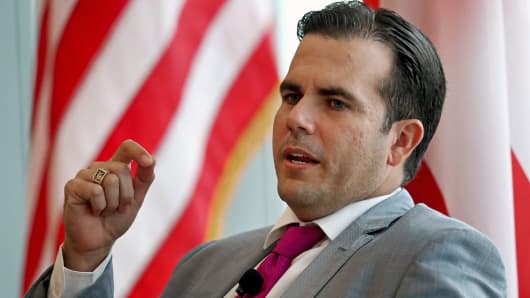On January 24, 2018, Governor Ricardo Rosselló submitted a revised fiscal plan for Puerto Rico's future following the destruction of Hurricane Maria in the autumn of 2017.
The fiscal plan, which will ultimately serve as a blueprint for the bankrupt island's much-needed economic turnaround, was expected to forecast Puerto Rico's economic standing over the next several years and to serve as a basis of negotiation with creditors, who are owed $74 billion in debt. Unfortunately, the Puerto Rican government's revisions have resulted in a vastly inferior fiscal strategy.
Just over a week after the fiscal plan was submitted, the PROMESA Oversight Board correctly rejected Governor Rosselló's plan, calling it a violation of the PROMESA law and giving the Governor a week to correct his mistakes. This week, the Governor submitted another revised fiscal plan that again misses the mark.
Among the violations listed were poor financial projections and a lack of specifics for structural reforms, municipal function consolidation and pension payments. The plan also includes a federal taxpayer bailout of Puerto Rico, requesting $17 billion of federal funds that would allow the island to pay $19 billion to creditors over a 30-year term at 4.5 percent.
Just as federal taxpayers should never be required to repay the debts of Illinois or California, Puerto Rico's government and its residents are primarily responsible for their debts.
For the process to work, the Rosselló Administration must be more transparent and include all parties involved if they are going to lay out a clear path for the island to regain access to capital markets, a crucial step for Puerto Rico's struggling economy. Puerto Rico's economy, with the right plan, could soar.
Taking a Step Backwards
The differences between the original 2017 plan and recently rejected one are stark. The 2017 plan spanned a 10-year period and allocated an average of $787 million per year for debt service payments – although that is less than a quarter of the $3.5 billion owed to creditors every year. In contrast, the 2018 plan covers a shortened span of only six years and allocates very little to creditors.
Aside from its shortsightedness, the plan also does not show that its implementation will allow Puerto Rico to regain access to capital markets, which was the primary goal of the Obama-era PROMESA law passed in 2016. In fact, the proposal seemingly ensures that Puerto Rico would not regain access to capital markets. No one in their right mind would maintain faith in the credit or integrity of such a government, and they would consequently refuse to lend to Puerto Rico.
Beyond such a major failing, the new plan offered by Governor Rosselló also contains significantly less financial information and explanation than the previous plan. Lack of financial transparency has consistently been a significant concern, as well as a frustrating hindrance during the Puerto Rico proceedings.
Most recently, on December 18, 2017, an updated bank account report from Puerto Rico's financial advisory authority disclosed a total balance of $6.9 billion in Puerto Rico's favor as of the end of last year, money that was unknown to creditors and Congress. This finding came just weeks before Governor Rosselló's demand for $94 billion from U.S taxpayers to aid economic recovery efforts in his revised fiscal plan.
Sadly, this latest fiscal plan is more of the same lack of transparency and attention to detail that landed Puerto Rico in the compromising position it is in today. The island still has yet to release audited financial statements, and fails to define essential services versus what the government wants to pay.
Bringing Everyone into the Fold
As economic advisor in 1978 to former Puerto Rico Governor Carlos Romero Barceló, whose fiscal record was impressive, I believe many of the solutions we adopted 40 years ago could be engaged in this current crisis to help turn the economy around.
What the people of Puerto Rico need is a comprehensive economic reform, including sweeping tax, workplace, regulatory, and welfare reforms at the federal and Commonwealth territory level to restore investment, growth and repopulation of the island. As the Tax Foundation put it, "Additional taxes without tax reform on an already weak economy are a recipe for financial collapse."
The Oversight Board has begun reviewing the latest fiscal plan with the goal of certifying a final scheme by March 30, 2018. But as Rep. Rob Bishop, chairman of the House Natural Resources Committee, has said, "The Board's stated goal under PROMESA is to return Puerto Rico to fiscal accountability and the capital markets, and this can only occur if the fiscal plans respect the lawful priorities and liens of debt holders."
Accuracy and transparency have been lacking from the very beginning of this process, with discussions held behind closed doors and almost zero disclosure to creditors of basic financial information. And while it may be politically tempting to let Wall Street take the hit for Puerto Rico's financial malfeasance, investors won't get burned twice—the long term repercussions could shut out Puerto Rico from credit markets and legitimate borrowing projects for years to come.
A serious plan that returns Puerto Rico to fiscal accountability and ensures future access to capital markets must start with pro-growth economic reforms, credible financials and projections, a 10-year time frame, and a program for debt service. That's the kind of financial plan that Puerto Ricans need, and all Americans deserve.
Commentary by Dr. Arthur B. Laffer, the founder and chairman of Laffer Associates, an economic research firm that provides global investment-research services to institutional asset managers, pension funds, financial institutions, and corporations.
For more insight from CNBC contributors, follow @CNBCopinion on Twitter.


